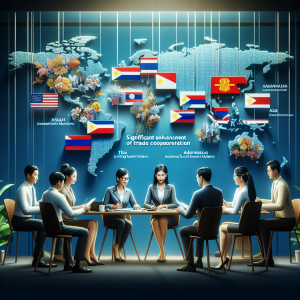The ongoing trade war between the United States and China, which began in earnest during the Trump administration in 2018, has created a complex web of economic challenges that continues to reverberate across the globe. As China grapples with the fallout of this prolonged conflict, it finds itself in a precarious position: needing allies to bolster its economic standing while facing the reality that it may have to navigate these turbulent waters largely on its own.
The trade war, characterized by heavy tariffs and retaliatory measures, was initially framed as a necessary step to address issues such as unfair trade practices and intellectual property theft. The U.S. imposed tariffs on over $360 billion worth of Chinese goods, while China retaliated with tariffs on more than $110 billion of U.S. products. This tit-for-tat strategy has led to increased costs for manufacturers and consumers alike, contributing to a slowdown in China’s economic growth and creating significant disruptions in the global supply chain. The fallout has been particularly pronounced in sectors like agriculture, where U.S. farmers, especially those exporting soybeans, have felt the sting of lost markets.
As the Biden administration has maintained these tariffs and introduced additional restrictions on Chinese technology firms, the prospect of a resolution seems increasingly remote. The strategy of decoupling from China has raised concerns about a broader economic split, with American companies seeking alternatives in other Asian nations such as Vietnam and India. This shift indicates a significant realignment in global trade dynamics, with countries that can offer competitive advantages benefiting from the trade diversion caused by the conflict.
The Need for Allies
Despite the challenges, China is acutely aware of the necessity for strategic partnerships in this environment. The nation has sought to strengthen ties with countries in Southeast Asia, Africa, and Europe, aiming to create a buffer against the economic pressures from the U.S. However, the efficacy of these partnerships has been called into question, as many nations are hesitant to fully align with China due to fears of U.S. retaliation or economic repercussions. As highlighted in a recent analysis, “China needs friends in Trump’s trade war,” yet the reality is that many potential allies are wary of entanglement in a conflict that shows no signs of resolution.
The Road Ahead
Looking forward, the trade war has underscored the complexities of international trade and the challenges of addressing economic imbalances through unilateral measures. While the Phase One agreement signed in January 2020 included commitments from China to increase imports from the U.S. and strengthen intellectual property protections, it failed to address the structural issues at the heart of the trade dispute. As the global economic landscape continues to shift, with rising protectionism and slowing growth, the implications for both the U.S. and China remain profound.
In conclusion, while China is in dire need of allies to navigate the challenges posed by the ongoing trade war, the geopolitical landscape is fraught with uncertainty. Xi Jinping’s administration may find itself increasingly isolated, forced to chart its course in a world where the balance of power is continually evolving. As tensions persist, the path forward will require not just economic strategy but also diplomatic finesse to forge lasting partnerships in an increasingly divided global economy.





